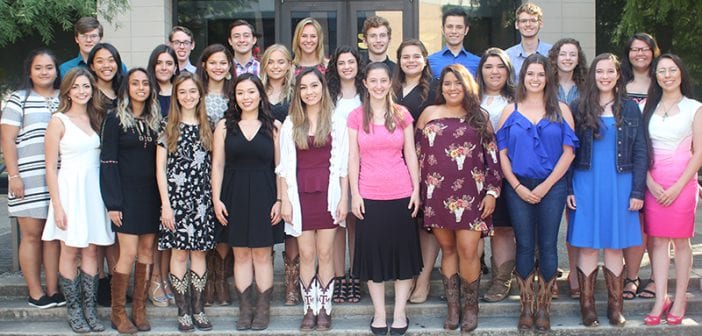Last week, 26 new Fellows attended a week-long intensive training in Houston, Texas, the first step of inauguration into Texas Right to Life’s Dr. Joseph Graham Fellowship for College Pro-Life Leaders. The Fellows learned leadership skills, as well as the scientific and psychological aspects of abortion and other beginning-of-life issues. Armed with knowledge and ability, the Fellows are able to promote a Culture of Life on their college campuses and within their communities.
On Sunday, June 10, Austin Cruz, a graduate of the University of St. Thomas and a former Fellow began the “Newbie” training. Austin introduced the Fellows to abortion methods and techniques, issues around euthanasia, and the legal history of abortion. The Fellows visited the Holocaust Museum to learn about the atrocities committed against human Life and how the culture of death is still prevalent within our society today. The Fellows also visited The Source for Women and learned about the amazing reproductive health resources that are available to women, resources that eliminate the perceived need for places like Planned Parenthood. The Fellows gained expertise from bioethicists on a range of issues concerning the use of abortion as discrimination against people with disabilities, embryonic stem cell research and in-vitro fertilization, adoption, family planning, and post-abortion counseling. Debbie Simmons, the Executive Director of Anchor Point in League City, discussed alternatives to abortion, and enumerated supportive financial and mental health resources available to both individuals and families.
In addition to the scientific and psychological research discussed, many speakers shared their personal stories with the Fellows. James Steward, an advocate for empowering Pro-Life men and women, shared his personal abortion story and the healing process that began years later. The Fellows also heard from Pro-Life advocate Julia Misley, who told of her forced late-term abortion after a three-year relationship with Steven Tyler, the lead singer of Aerosmith. Several other speakers also shared stories of overcoming life’s challenges and promoting a Culture of Life despite problem: struggling to maintain permanent housing, suffering sexual abuse, and maturing in families battling mental illness and alcoholism.
To supplement their extensive new knowledge of Pro-Life issues, the Fellows strengthened their planning and communication skills, thus enabling them to effectively discuss Pro-Life issues on their campuses and within their communities. In addition, the Fellows discovered their personal strengths and weakness. This discovery allowed them to converse eloquently about Pro-Life topics and embrace the truth even in the midst of controversy. The Fellows began to appreciate encouraging and valuing the talents and time of their leaders, members, and volunteers, a key component of growing their campus Pro-Life groups.
In the end, many Fellows built long lasting friendships, leaving with a real sense of camaraderie within the Pro-Life movement. Some in tears and many in excitement, Fellows expressed gratitude for the opportunity to learn about Pro-Life issues surrounded by such supportive peers. All concluded the training determined to promote and defend the Culture of Life.


